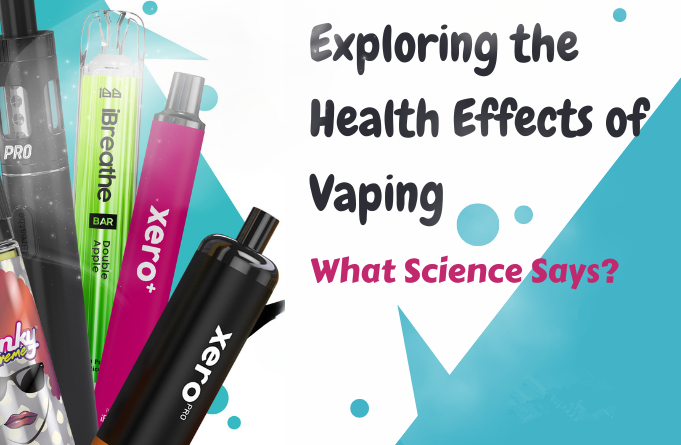
In a world where smoking has long dominated the scene, vaping has emerged as a popular alternative for those seeking a smoke-free lifestyle. But what does science have to say about the health effects of vaping?In this blog post, we will delve into the topic of vaping and explore the health effects associated with this popular alternative to traditional smoking. We will rely on scientific research and evidence available to provide you with an unbiased understanding of the subject.
Understanding Vaping
Vaping, also known as electronic cigarette use, involves inhaling and exhaling aerosol produced by an electronic device. This aerosol, commonly referred to as vapour, is created by heating an e-liquid that typically contains nicotine, flavourings, and other ingredients. Unlike traditional smoking, vaping does not involve the combustion of tobacco, which results in the release of harmful smoke and numerous toxic by-products.
Health Effects: What Science Says
1.Nicotine Addiction: It is important to note that many e-liquids contain nicotine, which is an addictive substance. Nicotine addiction can have various health implications and should be taken seriously. It is advisable to use e-liquids with lower nicotine levels or even opt for nicotine-free options if you are concerned about addiction.
2.Respiratory Health: Research suggests that vaping is generally associated with fewer respiratory health risks compared to traditional smoking. However, it is not without potential concerns. Some studies have found that certain chemicals present in e-liquids and aerosols can irritate the airways and lead to respiratory symptoms. It is crucial to choose reputable brands that prioritize safety and quality.
3.Cardiovascular Health: While vaping is considered less harmful than smoking in terms of cardiovascular health, it is not completely risk-free. Nicotine, even in e-liquids, can temporarily increase heart rate and blood pressure. Long-term effects on cardiovascular health are still being studied, and it is advisable to consult with a healthcare professional if you have pre-existing cardiovascular conditions.
4.Oral Health: Traditional smoking is known to have detrimental effects on oral health, including gum diseases and tooth loss. Vaping, on the other hand, appears to have a lesser impact on oral health. However, some studies have highlighted potential concerns such as dry mouth and an increased risk of cavities due to certain ingredients in e-liquids. Maintaining good oral hygiene practices is essential regardless of whether you vape or not.
5.Youth and Non-Smokers: Vaping among youth and individuals who have never smoked is a significant concern. Nicotine exposure during adolescence can have detrimental effects on brain development. It is crucial to prevent underage vaping and ensure that e-cigarette products are not marketed towards non-smokers or used as a gateway to traditional smoking.
Conclusion
In conclusion, vaping is a relatively new phenomenon, and scientific research is ongoing to understand its long-term effects fully. While vaping is generally considered less harmful than traditional smoking, it is not risk-free. It is essential to make informed choices, use reputable products, and prioritize your overall well-being.
Remember, if you have any specific health concerns or questions about vaping, it is always advisable to consult with a healthcare professional who can provide personalized advice based on your individual circumstances. Your journey towards a smoke-free lifestyle is important, and we are here to support you every step of the way.
